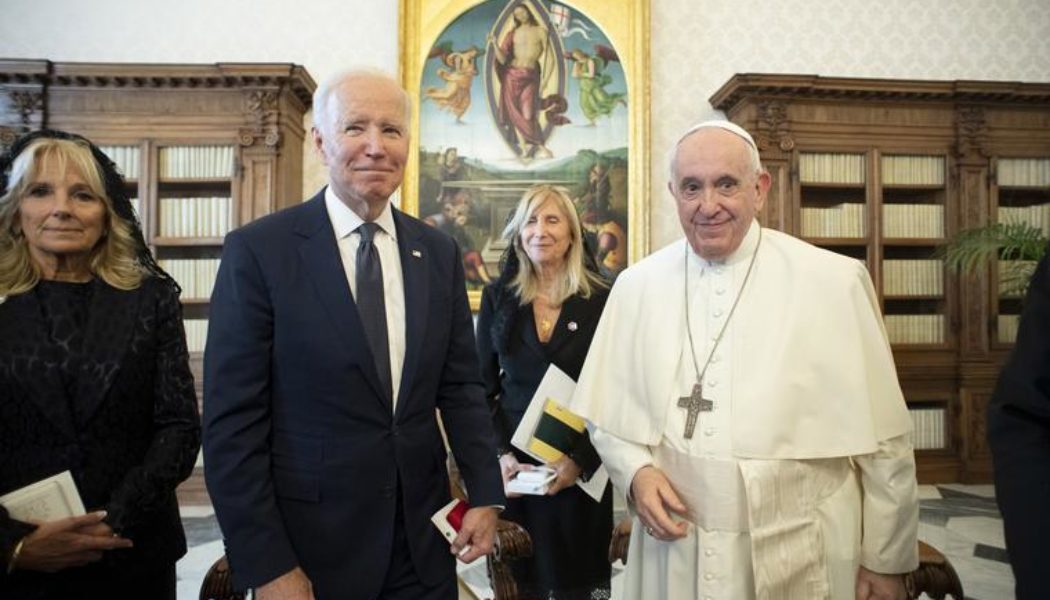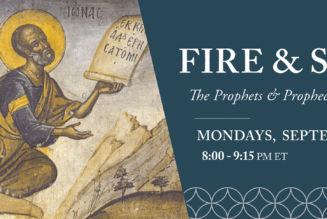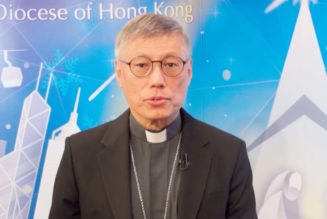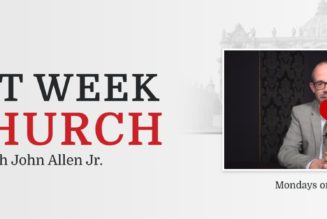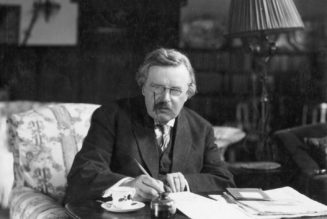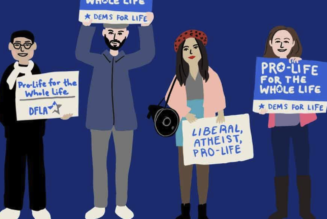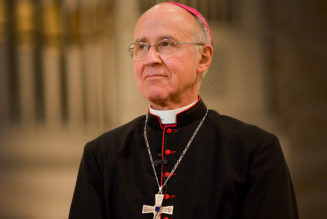
COMMENTARY: If what Biden says the Holy Father said is true, what they were discussing comes under Canon 916, not 915.
What President Joe Biden said that Pope Francis said to him about receiving Holy Communion is both plausible and implausible at the same time.
After his meeting with Pope Francis at the Vatican on Oct. 29, President Biden said that Pope Francis had told him that “he was happy that I am a good Catholic and that I should keep receiving Communion.”
Given the controversy about whether Biden should be denied Holy Communion due to his support for an expanded and radical abortion license, it was a major news story.
It’s possible that Biden did not understand what Pope Francis said, or that he was confused about it, or that he lied about it, but it seems fair to take the statement at face value. While the Vatican never comments on what is specifically said in such meetings, Pope Francis is more than capable of leaking a correction to friendly Jesuit media if he so desires. There was no such leak in this case.
That said, it is implausible that the Holy Father actually told Biden that he was a good Catholic. It is out of character for Pope Francis to praise anyone for being a good Catholic. Occasionally he will praise the ordinary faith of anonymous simple people, but when it comes to clergy, professors, business leaders, politicians — let alone the president of the United States — criticism, sometimes, harsh, is the norm. If Pope Francis told Biden that he is a good Catholic, it would be unusual.
It’s more likely that Pope Francis praised Biden for going to Mass every Sunday, even when traveling, something only a small minority of American Catholics bother to do. Or he may have praised Biden for being more religiously observant than most of his recent predecessors. That remains speculation.
If the question of receiving Holy Communion came up — and it is possible that Biden asked the Holy Father about it, given the prominence of the controversy — it is plausible that the Holy Father would have told Biden to keep receiving Holy Communion.
Recall that in 2014, Pope Francis called an Argentinian woman who had been told by her pastor that she should not receive Holy Communion because she was living with a civilly-divorced man who was still sacramentally married to another woman. The couple reported that Pope Francis told her that she should receive Holy Communion, going to a different parish if the local pastor insisted on upholding the sacramental discipline of the Church.
More recently, Pope Francis received President Alberto Fernández from his native Argentina. He is a Catholic who has explicitly said that he disagrees with the Catholic teaching that abortion is a grave evil, a position of theological dissent, not just public policy. He is also in an irregular marital situation, separated from his wife and living with another woman.
Nevertheless, both were given Holy Communion by Bishop Marcelo Sanchez Sorondo, head of the pontifical academies, during their 2020 visit. The occasion was a special Mass celebrated by the fellow Argentinian at the tomb of St. Peter, the holiest place in Rome.
In both Argentinian cases, the prohibition against receiving Holy Communion is clear, clearer than Biden’s case. Nevertheless, the Holy Father apparently approved of Holy Communion being administered.
Biden’s reporting of the papal comments actually shifted the issue, which is the bigger news.
Canon 915 of the Code of Canon Law states that those who “obstinately persist in manifest grave sin” should not be admitted to Holy Communion. That means that the minister of Holy Communion ought to refuse Holy Communion in such cases.
The controversy — heated and stretching over generations — is whether Canon 915 means that political figures such as Biden or House Speaker Nancy Pelosi should be denied Holy Communion if they present themselves to receive. In practice this is very rarely done in the United States, and almost never even discussed elsewhere. But the controversy carries on.
Canon 916 is different, stating that those “who are conscious of grave sin” whether manifest, obstinate or not, should not present themselves to receive Holy Communion. That is not controversial; First Holy Communion children learn that someone who has committed a mortal sin should not receive Holy Communion without going to confession first.
Canon 915 speaks about the responsibility of ministers. Canon 916 addresses the decision of individual Catholics to present themselves for Holy Communion.
The vast majority of U.S. bishops, regarding pro-abortion politicians, do not apply Canon 915 to deny them Holy Communion. It is likely that a solid majority would expect them to abide by Canon 916, and not present themselves.
If what Biden says the Holy Father said is true, what they were discussing comes under Canon 916, not 915. It means that Pope Francis has judged that even Canon 916 does not apply to Biden, namely that his promotion of the radical abortion license does not constitute a grave sin, which requires repentance and sacramental absolution.
That Pope Francis considers abortion a grave sin and an unspeakable crime is beyond doubt — he likens it to hiring an assassin. But it seems Pope Francis does not think Canon 916 applies as widely as usually thought, whether in relation to divorce-and-remarriage, or in terms of public promotion of abortion.
It is a matter that requires clarification, not hearsay evidence, even from the president of the United States.
Join Our Telegram Group : Salvation & Prosperity
